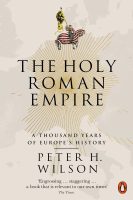Keeping a thousand years of European history readable is no small feat, but Peter H. Wilson manages it.
The Holy Roman Empire touches on everything from high politics to peasant life. Wilson’s central insight: the empire’s perceived weaknesses were its strengths.
The Holy Roman Empire changed composition through the centuries. Its internal organization was in a constant state of flux. Emperors had to negotiate to come to power and compromise to stay in power. Autonomy given to one city or prince did not necessarily apply to another. For a long time, such agreements were not even written down. The empire refused to lay down one law, one language, one religion. It ended up a patchwork of overlapping competencies and jurisdictions that kept bureaucrats, lawyers and politicians busy for centuries.
After the empire fell before Napoleon, and most of its territory was absorbed by what would later be called the Second German Empire, German historians blamed the first for retarding the evolution of the German nation.
This has colored the historiography since. Histories are written from the perspective of the nations of today, but different peoples and places, with their own histories and their own identities, existed in their place.
The Holy Roman Empire’s genius was that it respected those histories and identities. It didn’t have a “mission” beyond the personal ambitions of its high officials that could inspire people to rise up against anyone. By and large, the Holy Roman Empire left its people alone.
Compare their fate to contemporaries and descendants who lived under so-called “strong” states and the Holy Roman Empire doesn’t look so bad in comparison nor retrospect.

